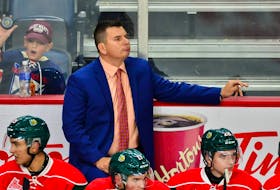Via TSN
Like most people, Brad Gushue is worried about the COVID-19 pandemic.
But his worry extends beyond the obvious concern, which of course is health.
In a story posted on www.tsn.ca this week, Gushue admits he’s concerned about the future of curling’s smaller events.
He’s worried the sport’s smaller, non-televised events will struggle to land sponsorships in the wake of the COVID-19 pandemic.
Shortly after skipping Mark Nichols, Brett Gallant and Geoff Walker to Newfoundland and Labrador’s third Tim Hortons Brier championship in four years last month in Kingston, Ont., it was announced the World Men’s Curling Championship in Glasgow, Scotland was cancelled.
Also cancelled were the world women’s, mixed doubles and senior championships, and the end-of-season events on the World Curling Tour.
“We were all disappointed, but we understand the situation,” Gushue told TSN senior reporter Bob Weeks. “Obviously people’s lives are far more important than playing a curling event.”
The impact of that is still being felt on many levels, but for Gushue, a bigger concern may be what happens next year.
“I worry about what’s going to happen to some of the smaller, non-televised events,” he said to Weeks. “Those rely a lot on small-to-medium-sized businesses to fund the purses, those $5,000 and $10,000 sponsorships.”
Weeks reported there are very few curlers who make their living full-time on the curling ice and for many, a drop in the number of events offering cash prizes means less opportunity to survive as a curler.
At the level below the very top teams, players might earn up to 50 per cent of their income in prize money, so smaller purses or fewer events would be significant.
www.tsn.ca









